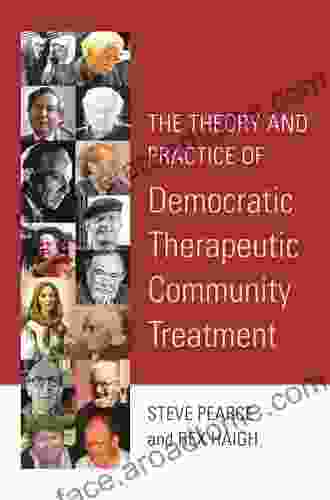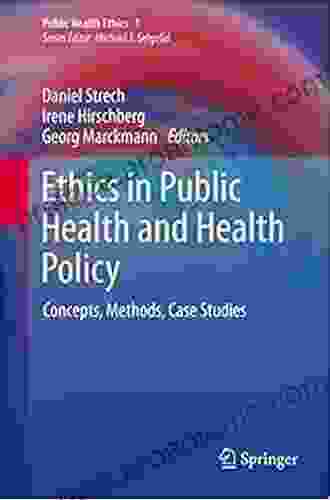Ethics In Public Health And Health Policy: A Comprehensive Guide

Public health and health policy are complex fields that involve a wide range of ethical issues. These issues can be difficult to navigate, and it is important to have a strong understanding of the ethical principles that should guide decision-making. This book provides a comprehensive overview of the ethical issues that arise in public health and health policy. It covers a wide range of topics, including:
- The ethical principles that should guide public health decision-making
- The ethical challenges of allocating scarce resources
- The ethical implications of new technologies
- The role of ethics in public health research
- The ethical implications of public health interventions
This book is essential reading for anyone who works in public health or health policy. It is also a valuable resource for students and researchers in these fields.
The first chapter of the book provides an overview of the ethical principles that should guide public health decision-making. These principles include:
5 out of 5
| Language | : | English |
| File size | : | 621 KB |
| Text-to-Speech | : | Enabled |
| Screen Reader | : | Supported |
| Enhanced typesetting | : | Enabled |
| Word Wise | : | Enabled |
| Print length | : | 242 pages |
- Beneficence: The principle of beneficence requires that public health decisions should be made in the best interests of the population. This means that decisions should be made to promote health and well-being, and to prevent harm.
- Non-maleficence: The principle of non-maleficence requires that public health decisions should not cause harm. This means that decisions should be made to avoid or minimize the risk of harm to individuals or populations.
- Justice: The principle of justice requires that public health decisions should be fair and equitable. This means that decisions should not discriminate against any particular group of people, and that everyone should have access to the same opportunities for health and well-being.
- Autonomy: The principle of autonomy requires that public health decisions should respect the autonomy of individuals. This means that individuals should have the right to make their own decisions about their health, and that public health decisions should not be made without their consent.
These four principles are the foundation of ethical decision-making in public health. They provide a framework for evaluating the ethical implications of public health decisions, and for making decisions that are in the best interests of the population.
One of the most challenging ethical issues in public health is the allocation of scarce resources. Public health budgets are often limited, and it is impossible to meet all of the needs of the population. This means that decisions must be made about how to allocate resources in a fair and equitable way.
There are a number of different ethical principles that can be used to guide resource allocation decisions. These principles include:
- The principle of need: This principle holds that resources should be allocated to those who have the greatest need.
- The principle of equality: This principle holds that resources should be allocated equally to all members of the population.
- The principle of efficiency: This principle holds that resources should be allocated in a way that maximizes the overall benefit to the population.
The choice of which ethical principle to use to guide resource allocation decisions is complex. There is no one right answer, and the best approach will vary depending on the specific circumstances. However, it is important to be aware of the different ethical principles that are available, and to use them to make decisions that are fair and equitable.
New technologies are constantly being developed that have the potential to improve public health. However, these technologies also raise a number of ethical concerns. These concerns include:
- The privacy of health information: New technologies can make it easier to collect and share health information. This raises concerns about the privacy of this information, and how it might be used to discriminate against individuals.
- The safety of new technologies: New technologies can also raise concerns about safety. It is important to evaluate the safety of new technologies before they are widely used in public health.
- The equity of access to new technologies: New technologies can also be expensive, and this raises concerns about equity of access. It is important to ensure that everyone has access to the same opportunities to benefit from new technologies.
The ethical implications of new technologies are complex. It is important to be aware of these concerns, and to use new technologies in a way that is ethical and responsible.
Public health research is essential for improving our understanding of public health issues and developing new ways to promote health and well-being. However, public health research also raises a number of ethical concerns. These concerns include:
- The privacy of research participants: Public health research often involves the collection of sensitive health information. It is important to protect the privacy of research participants, and to ensure that their information is used only for research purposes.
- The safety of research participants: Public health research may involve the use of experimental treatments or interventions. It is important to ensure that research participants are safe, and that they are fully informed of the risks and benefits of participation in research.
- The equity of access to research benefits: Public health research should be designed to benefit the entire population. However, there is a risk that the benefits of research will not be equally distributed. It is important to ensure that everyone has access to the same opportunities to benefit from research.
The ethical implications of public health research are complex. It is important to be aware of these concerns, and to design and conduct research in a way that is ethical and responsible.
Public health interventions are designed to improve public health and well-being. However, these interventions can also raise a number of ethical concerns. These concerns include:
- The privacy of health information: Public health interventions often involve the collection of health information. It is important to protect the privacy of this information, and to ensure that it is used only for public health purposes.
- The freedom of choice: Public health interventions may limit the freedom of choice of individuals. For example, mandatory vaccination programs may limit the freedom of individuals to choose whether or not to vaccinate their children. It is important to weigh the benefits of public health interventions against the potential risks to individual freedom.
- The equity of access to public health interventions: Public health interventions should be designed to benefit the entire population. However, there is a risk that the benefits of interventions will not be equally distributed. It is important to ensure that everyone has access to the same opportunities to benefit from public health interventions.
The ethical implications of public health interventions are complex. It is important to be aware of these concerns, and to design and implement interventions in a way that is ethical and responsible.
Ethics are essential to public health and health policy. The ethical principles that should guide public health decision-making, the ethical challenges of allocating scarce resources, the ethical implications of new technologies, the role of ethics in public health research, and the ethical implications of public health interventions. By understanding these ethical issues, we can make better decisions about how to promote health and well-being, and how to protect the rights of individuals and communities.
5 out of 5
| Language | : | English |
| File size | : | 621 KB |
| Text-to-Speech | : | Enabled |
| Screen Reader | : | Supported |
| Enhanced typesetting | : | Enabled |
| Word Wise | : | Enabled |
| Print length | : | 242 pages |
Do you want to contribute by writing guest posts on this blog?
Please contact us and send us a resume of previous articles that you have written.
 Book
Book Novel
Novel Page
Page Chapter
Chapter Text
Text Story
Story Genre
Genre Reader
Reader Library
Library Paperback
Paperback E-book
E-book Magazine
Magazine Newspaper
Newspaper Paragraph
Paragraph Sentence
Sentence Bookmark
Bookmark Shelf
Shelf Glossary
Glossary Bibliography
Bibliography Foreword
Foreword Preface
Preface Synopsis
Synopsis Annotation
Annotation Footnote
Footnote Manuscript
Manuscript Scroll
Scroll Codex
Codex Tome
Tome Bestseller
Bestseller Classics
Classics Library card
Library card Narrative
Narrative Biography
Biography Autobiography
Autobiography Memoir
Memoir Reference
Reference Encyclopedia
Encyclopedia Diane Cook
Diane Cook John Bergsma
John Bergsma P Pollei
P Pollei Jason Goldtrap
Jason Goldtrap Karen G Mills
Karen G Mills Rev Jacques Philippe
Rev Jacques Philippe Geoff Cumming
Geoff Cumming Diane Spicer
Diane Spicer Jeri Laber
Jeri Laber Don Daniels
Don Daniels Dianne Harman
Dianne Harman Don Boys
Don Boys Mario C Deng
Mario C Deng Zig Ziglar
Zig Ziglar Tom Fishburne
Tom Fishburne Robert Walker
Robert Walker Dr Ajay K Seth
Dr Ajay K Seth Mary Toscano
Mary Toscano Donna J Leban
Donna J Leban Diana Welkins
Diana Welkins
Light bulbAdvertise smarter! Our strategic ad space ensures maximum exposure. Reserve your spot today!

 Daniel KnightExploration and Analysis of DNA Microarray and Other High-Dimensional Data: A...
Daniel KnightExploration and Analysis of DNA Microarray and Other High-Dimensional Data: A...
 Fletcher MitchellSpent Nuclear Fuel And Accelerator Driven Subcritical Systems: Green Energy...
Fletcher MitchellSpent Nuclear Fuel And Accelerator Driven Subcritical Systems: Green Energy...
 Bernard PowellThe Theory and Practice of Democratic Therapeutic Community Treatment: A...
Bernard PowellThe Theory and Practice of Democratic Therapeutic Community Treatment: A... Danny SimmonsFollow ·3.9k
Danny SimmonsFollow ·3.9k Carl WalkerFollow ·3.6k
Carl WalkerFollow ·3.6k Cortez ReedFollow ·7.9k
Cortez ReedFollow ·7.9k Haruki MurakamiFollow ·5k
Haruki MurakamiFollow ·5k Charles DickensFollow ·12.1k
Charles DickensFollow ·12.1k Joshua ReedFollow ·16.9k
Joshua ReedFollow ·16.9k Fredrick CoxFollow ·18.2k
Fredrick CoxFollow ·18.2k Jason HayesFollow ·8.1k
Jason HayesFollow ·8.1k

 Brandon Cox
Brandon CoxUnveiling the Secrets of Core Concepts: The Ultimate...
Are you ready to unlock the doors...

 Colt Simmons
Colt SimmonsUnlock Your True Potential: Uncover the Real Reasons For...
Embark on a...

 Ivan Turner
Ivan TurnerLove You Mom But You And Dad Are Getting a Divorce
A Heartfelt and...

 Ervin Bell
Ervin BellIntroducing Mouse Paul Moorcraft: A Captivating Tale of...
Embark on an Unforgettable Journey...

 Mike Hayes
Mike HayesBattling Obesity In Teens And Shaping The Future
The Growing...

 Yasushi Inoue
Yasushi InoueEmbark on a Culinary and Cultural Voyage: Delve into the...
A Tapestry of...
5 out of 5
| Language | : | English |
| File size | : | 621 KB |
| Text-to-Speech | : | Enabled |
| Screen Reader | : | Supported |
| Enhanced typesetting | : | Enabled |
| Word Wise | : | Enabled |
| Print length | : | 242 pages |






